As technology advances, AI is no longer limited to large budgets for complex computing. It’s now accessible to businesses of all sizes.
Until recently, AI tools were mainly used by big companies to handle routine tasks, analyze large amounts of data, and manage risky operations, all of which help businesses.
Smaller businesses couldn’t afford these tools, so they missed out on benefits like improved efficiency, better cybersecurity, predicting trends, and understanding customers deeply.
Platforms like ChatGPT are democratized AI, making it easier to use for everyone, giving small businesses more options. This means you don’t have to be an expert to benefit from AI anymore, which is great news.
It helps smaller businesses grow and encourages new ideas because more companies can join.
Let’s take a look at some AI use cases that are helping small businesses compete with bigger ones.
Use Case 1: Lead Generation Optimization
AI-powered lead generation tools use smart algorithms to help small businesses find and reach potential customers better.
They analyze how customers behave and what they like, which helps businesses improve how they find new leads. This usually means more people become customers, leading to more sales.
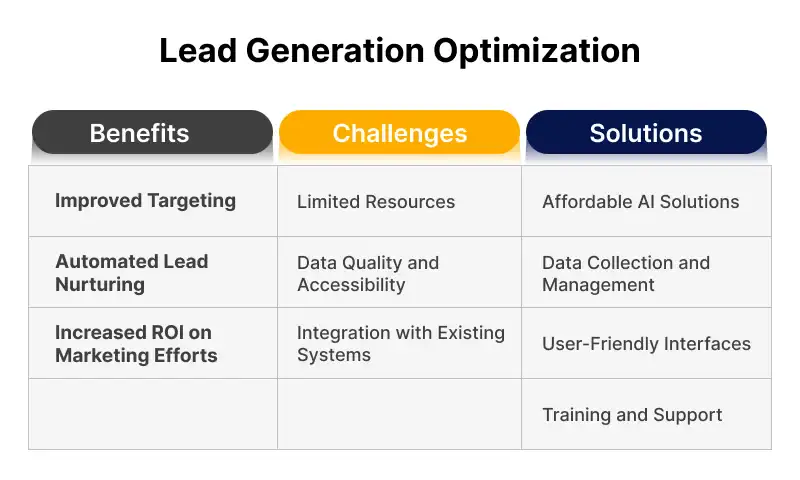
Benefits
- Improved Targeting: Democratized AI algorithms look at a lot of customer information to find patterns and trends. This helps businesses aim their marketing more accurately. When they do this, they get better quality leads and people are more interested in what they’re offering.
- Automated Lead Nurturing: AI-powered automation makes the process of nurturing leads smoother by sending personalized content and messages to leads when they need it. This keeps communication consistent and helps leads move through the sales process faster.
- Increased ROI on Marketing Efforts: The benefits of AI tools help small businesses use their AI/ML for marketing money better by finding and taking care of leads more effectively. This helps them spend money more smartly, concentrating on the things that bring in the most customers.
Challenges for Small Businesses
- Limited Resources: Small businesses usually don’t have enough money or people to buy advanced AI tools for generating leads.
- Data Quality and Accessibility: Small businesses might find it challenging to collect customer information, making it hard for AI tools to find and connect with expected customers.
- Integration with Existing Systems: Small businesses might not have the necessary tech knowledge and may struggle to incorporate democratizing AI tools with their current marketing setups, which could take a lot of time and effort.
Solutions
- Affordable AI Solutions: Look for lead generation tools harnessed by Democratized AI that are made for small businesses. They should have prices that fit your budget and features that can grow along with your business.
- Data Collection and Management: Improve data collection and organization by using tools like CRM software or getting assistance from data enhancement services.
- User-Friendly Interfaces: Look for AI business tools that are easy to use and match with how your small business team works. This helps everyone learn fast and makes it simple for the team to begin using the tools.
- Training and Support: Offer training and support to your employees so they can use AI tools to find leads and make sales.
ValueCoders offers tailored AI solutions to help you stay ahead of the competition and drive success.
Use Case 2: Personalized Customer Experience
AI algorithms will examine how customers interact with a business to make marketing messages, product suggestions, and customer service interactions more personal. This personalized experience makes each customer feel special, making them happier and more likely to stay loyal to the business.
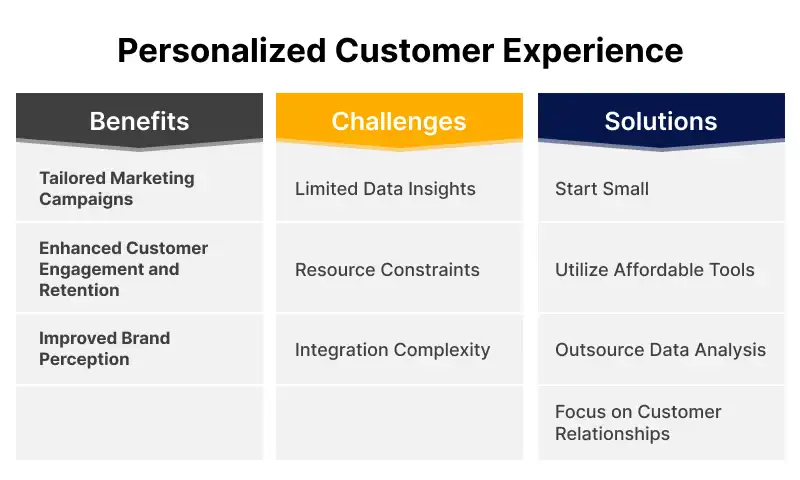
Benefits
- Tailored Marketing Campaigns: When businesses understand what their customers like and how they behave, they can create more personalized marketing campaigns. This makes customers more interested, and such customers are more likely to buy from them.
- Enhanced Customer Engagement and Retention: Offering personalized experiences with Democratized AI makes customers feel closer to the business. This boosts their ability to make repeat purchases and stay loyal over time. Customers appreciate when businesses pay attention to their wants and needs.
- Improved Brand Perception: Giving customers personalized experiences shows that a business cares about making them satisfied and trying new things. This makes people think of the brand and makes it stand out from other companies.
Challenges for Small Businesses
- Limited Data Insights: Small businesses might find it hard to get enough customer information and understand it well enough to use it for making things more personal.
- Resource Constraints: Using AI tools to personalize things might cost a lot of money and need technical skills that small businesses might not have.
- Integration Complexity: For small businesses that don’t have a lot of IT resources, connecting AI-powered personalization tools to their current systems and ways of working can be hard.
Solutions
- Start Small: Start by gathering basic customer information using easy methods like email sign-ups or tracking what they buy. As your resources grow, you can collect more data in other ways.
- Utilize Affordable Tools: Search for AI tools that personalize things and have prices that fit small business budgets. Think about using cloud-based options that don’t need a lot of money upfront.
- Outsource Data Analysis: Think about outsourcing best AI development companies or experts who are good at analyzing data about customers. This can help small businesses gain knowledge and understand their customers better without needing to do it themselves.
- Focus on Customer Relationships: Build genuine connections with customers by engaging with them personally and providing excellent service. Even without advanced technology, demonstrating care can significantly impact how customers perceive your business.
Use Case 3: Operational Efficiency Enhancement
AI-driven automation simplifies tasks like inventory management, supply chain organization, and maintenance scheduling. Integration of AI/ML in business operations reduces manual work, saves costs, and boosts productivity.
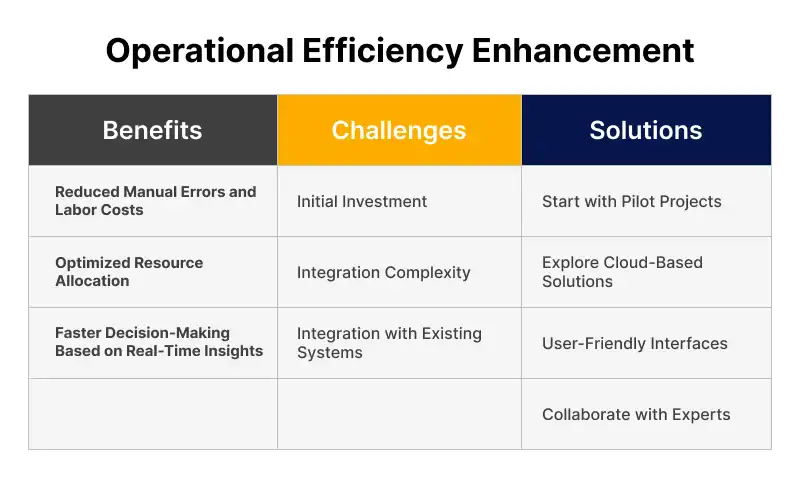
Benefits
- Reduced Manual Errors and Labor Costs: Automation lowers the chance of mistakes when doing everyday tasks, which makes things more accurate and efficient. This means businesses can spend less on workers doing things manually.
- Optimized Resource Allocation: Artificial Intelligence in business algorithms studies information to make sure resources are used well. This means keeping the right amount of inventory, planning production schedules well, and using resources in the best way possible.
- Faster Decision-Making Based on Real-Time Insights: Democratized AI systems offer real-time updates to businesses about how well things are going, helping them make quick and smart choices. This agility is important for keeping up in today’s fast business world.
Challenges for Small Businesses
- Initial Investment: Setting up AI-driven automation systems might initially need a big investment. This includes buying the technology, getting it to work, and training staff to use it.
- Integration Complexity: Connecting AI systems to existing processes of working and technology can be hard, especially for small businesses that don’t have a lot of IT knowledge or resources.
- Data Quality and Accessibility: Small businesses might have problems with data quality and not enough access to the right information, which can make AI algorithms less effective in making operations better.
Solutions
- Start with Pilot Projects: Begin with small projects to show how AI automation can help in certain parts of the business. This way, you can slowly introduce it and not take big risks by doing everything at once.
- Explore Cloud-Based Solutions: Consider using AI cloud platforms that can grow with your business. They usually don’t require a lot of upfront costs, and you can make them bigger as your business grows.
- Invest in Training: Make sure your employees know how to use Democratized AI tools by giving them training and support. Investing in teaching them can help with any problems that come up when using new technology.
- Collaborate with Experts: Work with companies or experts who know a lot about AI and help small businesses. They can help you choose and use the right tools that fit your business’s needs and limits.
Use Case 4: Competitive Intelligence
AI tools help small businesses monitor what their competitors are doing along with their strategies, prices, and what’s happening in the market.
By using AI, businesses can know essential information that can help them make smart decisions and stay ahead of their competition.
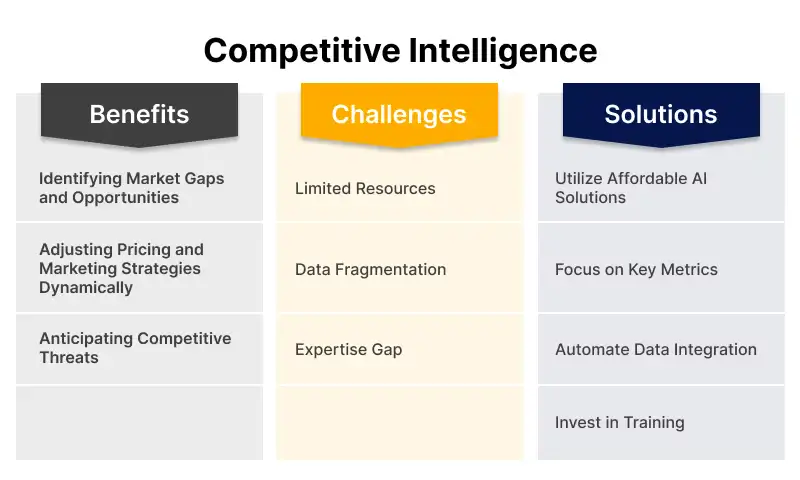
Benefits
- Identifying Market Gaps and Opportunities: AI algorithms look at market information to find new trends, what customers like, and parts of the market that haven’t been used much. This helps businesses find chances to grow and try new things.
- Adjusting Pricing and Marketing Strategies Dynamically: By always watching what competitors charge and how they advertise, businesses can change their own plans quickly to stay competitive. This helps them react fast to changes in what people want and how they act in the market.
- Anticipating Competitive Threats: Democratized AI tools that analyze competition can tell businesses early if there might be new problems from competitors, like if they’re launching new products or doing new things. This helps businesses be ready and protect their place in the market.
Challenges for Small Businesses
- Limited Resources: Small businesses might not have enough money or people to buy advanced AI tools for understanding their competition.
- Data Fragmentation: Small businesses might find it hard to get information from different places like market reports, social media, and competitor websites. This makes it tough for them to do a thorough job of studying their competition.
- Expertise Gap: Small businesses might not have the know-how or experience to understand and use the information they get from AI tools that analyze their competition.
Solutions
- Utilize Affordable AI Solutions: Find competitive AI tools and offer prices that small businesses can afford. Consider options where you can pay a subscription fee or only pay for what you use, so you don’t have to spend a lot of money upfront.
- Focus on Key Metrics: Focus on collecting and studying key performance measures (KPIs) that match your business goals and competition. This helps you use your resources wisely and get the most out of them.
- Automate Data Integration: Look into tools and platforms that automatically gather, organize, and study data from different places. This saves time and effort when getting useful information and helps you make decisions faster.
- Invest in Training: Offer training and chances for employees to get better at analyzing competition and understanding data. You could also work with outside experts or companies who know a lot about competitive intelligence to help your team.
Leverage ValueCoders' AI expertise to scale your small business operations.
Use Case 5: Financial Management Assistance
AI-powered financial management tools assist small businesses in tasks such as budgeting, forecasting, and cash flow management.
These tools use intelligent algorithms to provide guidance that helps in financial decision-making and risk management.
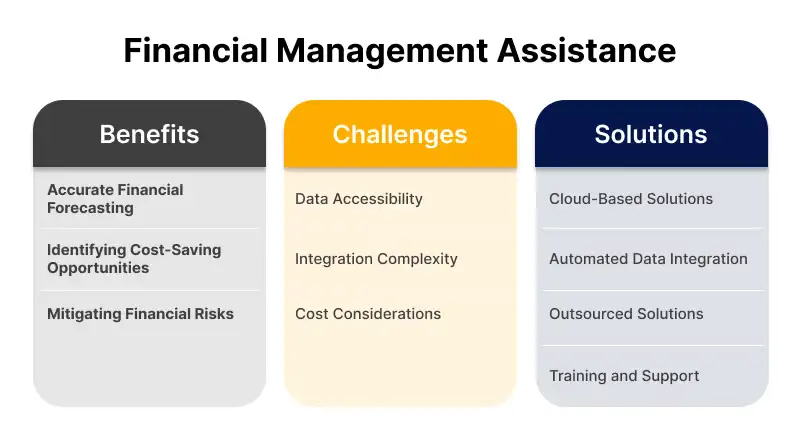
Benefits
- Accurate Financial Forecasting: Democratized AI algorithms study past data and make guesses about what’s happening in the market and how much money a business will require in the future. This helps businesses be prepared for what’s coming and plan the next steps accordingly.
- Identifying Cost-Saving Opportunities: AI financial tools examine how money is being spent and find instances where it’s being wasted. This helps businesses see where they can spend less and get more ROI.
- Mitigating Financial Risks: AI algorithms check different things that could be risky for finances, like how prices change a lot and if someone might not pay money back. This helps businesses see what problems might happen and do things to stop them before they happen, keeping their finances safe.
Challenges for Small Businesses
- Data Accessibility: Gathering financial data from various sources like accounting software, bank statements, and invoices can be challenging for small businesses. This makes it difficult to utilize AI tools for financial management.
- Integration Complexity: Incorporating AI financial tools with a business’s existing systems and workflows can be difficult and time-consuming. Especially for small businesses that may lack technical knowledge.
- Cost Considerations: Implementing Democratized AI tools for financial management may need a significant upfront investment, such as purchasing the technology and training staff to use it. This can be problematic for small businesses with limited financial resources.
Solutions
- Cloud-Based Solutions: Think about using AI financial tools that are on the cloud. They usually have prices that fit your budget and can work well with the accounting software you already use. Cloud-based options usually don’t need a lot of money upfront, and they can get bigger as your business grows.
- Automated Data Integration: Look into tools and tech that automatically gather and put together financial information from different places. This makes it easier to manage data and means your team doesn’t have to work as hard to get it all together.
- Outsourced Solutions: Think about hiring top AI development companies or experts who know a lot about using AI for business financial analysis. This can help small businesses get knowledge and tools without requiring to spend a lot of money upfront.
- Training and Support: Make sure your employees know how to use AI financial tools by giving them training. This could include workshops, online classes, or training while they’re working, all designed to fit what your business needs.
Use Case 6: Excellent Customer Care Keeps Them Coming Back
AI tools for customer service help small businesses give great experiences to customers. They do this by talking to customers in a personal way, giving help quickly, and reaching out to them first.
These tools use smart algorithms to know what customers want and need, which helps make them happy and keep coming back.
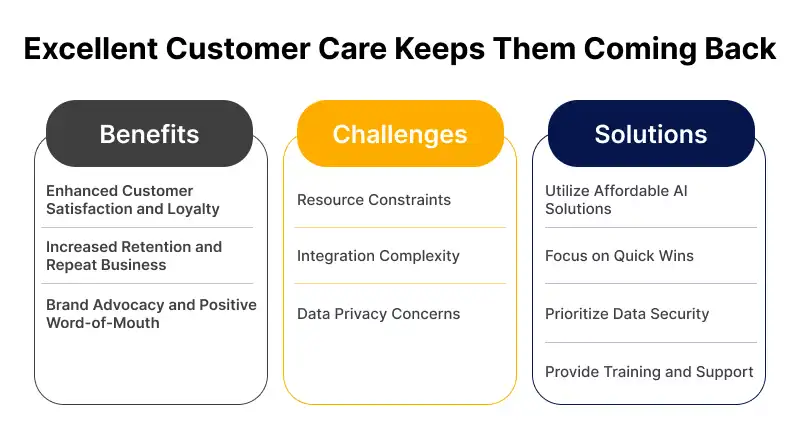
Benefits
- Enhanced Customer Satisfaction and Loyalty: Democratized AI customer service tools help businesses offer personalized replies quickly and respond well to customer questions, fixing problems and dealing with worries. This makes customers happier and more likely to stay with the business.
- Increased Retention and Repeat Business: When businesses offer great customer experiences, they build strong connections with their customers. This helps in repeat customers and staying loyal to the company. A happy customers is more likely to come back and keep doing business with the company.
- Brand Advocacy and Positive Word-of-Mouth: When customers are happy, they often tell their friends, family, and coworkers about the business. This good word-of-mouth can bring in new customers and make the company’s reputation even better in the market.
Challenges for Small Businesses
- Resource Constraints: Small businesses might not have enough money or people to buy advanced AI tools for customer service.
- Integration Complexity: Connecting Democratized AI customer service tools to the systems and ways of working a business already uses can be hard and take a lot of time. It needs people who are good with technology and enough resources.
- Data Privacy Concerns: Small businesses need to make sure that AI customer service tools follow the rules about keeping customer information private and safe.
Solutions
- Utilize Affordable AI Solutions: Search for AI development company that have prices that small businesses can afford. Many companies offer options that can get bigger as your business grows.
- Focus on Quick Wins: Begin by using AI customer service tools in places where they can help right away, like answering common questions automatically or sending customer questions to the right part of the business.
- Prioritize Data Security: Pick AI companies that focus on keeping data safe and following rules like GDPR or CCPA. Make sure that customer information is always encrypted and safe during the customer service process.
- Provide Training and Support: Train your employees so they feel confident using Democratized AI tools for customer service and know how to use them well to make customers happier. Also, give them support whenever they need help or have questions while they’re learning to use the tools.
Use Case 7: Cybersecurity Must Address Evolving Threats
AI cybersecurity tools are vital for small businesses to protect their critical information and systems from evolving cyber threats. These tools use the power of AI to detect and prevent threats before they arise, ensuring uninterrupted business operations and maintaining trust with customers.
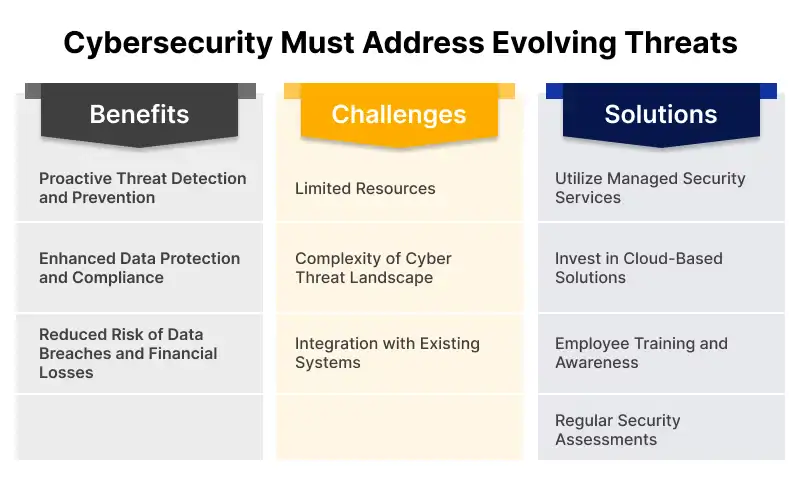
Benefits
- Proactive Threat Detection and Prevention: AI algorithms study large amounts of data to identify patterns and anomalies that could show potential cyber threats. By identifying threats in real-time, businesses can take action to prevent them before they cause any harm.
- Enhanced Data Protection and Compliance: Democratized AI cybersecurity tools assist businesses in establishing robust security measures to protect against sensitive information from unauthorized access or breaches. This ensures customer data remains secure and the business complies with regulations like GDPR or CCPA.
- Reduced Risk of Data Breaches and Financial Losses: AI cybersecurity tools quickly detect and prevent cyber threats, lowering the risk of hackers accessing and stealing information or causing financial harm to the business. This maintains the business’s reputation and ensures continued trust from customers.
Challenges for Small Businesses
- Limited Resources: Small businesses might not have enough money or know-how to buy and use AI tools for cybersecurity the right way.
- Complexity of Cyber Threat Landscape: The always-changing cyber threats are a big problem for small businesses. They might have trouble keeping track of new threats and problems.
- Integration with Existing Systems: Connecting Democratized AI cybersecurity tools to the systems and security stuff a business already uses can be hard and take a lot of time. It needs people who are good with technology and enough resources.
Solutions
- Utilize Managed Security Services: Consider partnering with Managed Security Service Providers (MSSPs) who specialize in keeping online businesses safe. They’re experts in cybersecurity and can tailor security solutions to meet the budgets and needs of small businesses.
- Invest in Cloud-Based Solutions: Check out AI cybersecurity tools that work online (in the cloud) and can change to fit what the business needs. These tools usually cost less at the start and can fit with the technology the business already uses.
- Employee Training and Awareness: Spend time and resources on teaching employees about cybersecurity so they know how important it is and can spot and deal with potential threats. This helps lower risks and makes the business more secure overall.
- Regular Security Assessments: Regularly inspect and assess the security of the company’s computer systems to find any issues or weaknesses. This helps solve problems before they get serious and makes it tougher for cyber attacks to occur.
ValueCoders' personalized AI solutions can enhance customer satisfaction anddriving success.
Concluding Thoughts
In closing, AI is becoming available to everyone, and the democratization of AI is changing how small businesses work and expand.
Using AI tools helps businesses improve finding potential customers, make each customer’s experience special, work more efficiently, and understand their competition better.
Even though there are challenges like not having enough money or knowing enough about technology, AI tools made for small businesses give chances to grow.
By spending on training and using easy-to-use AI programs, businesses can use AI to make smart choices, make things easier, and keep growing in today’s fast-changing market.
In the digital age, small businesses can do well, come up with new ideas, and succeed due to the democratization of AI.
Ready to discover AI’s potential for your small business? Contact ValueCoders today to explore AI solutions tailored to your needs and take your business to the next level.



